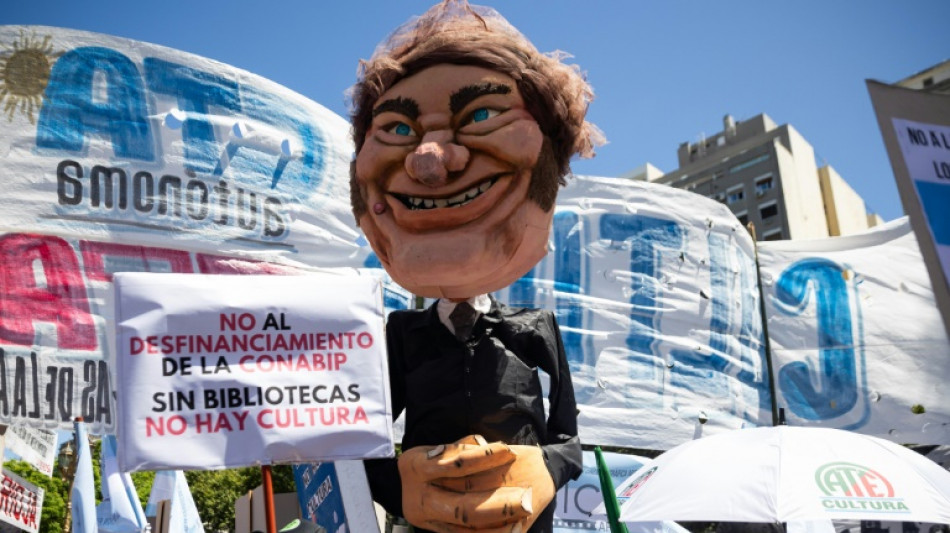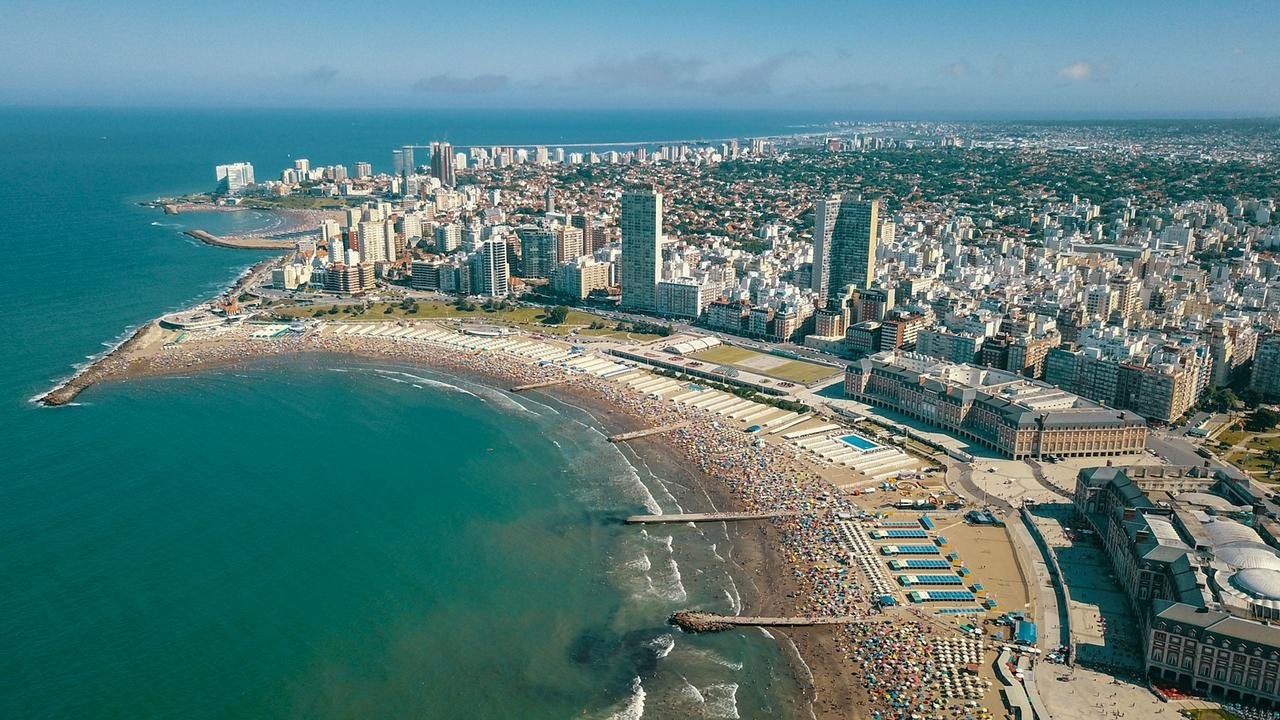peppertree
peppertree's JournalAmid record drought, Argentina's GDP slips 1.6% in 2023
Argentina's INDEC statistics bureau reported that the nation's economy declined by 1.6% in 2023, after two years of strong growth averaging 7.8%.
The Argentine economy, the third-largest in Latin America, fell 4.5% in December however - as shock policies decreed by newly-elected far-right President Javier Milei began to take effect.
High inflation - a fixture of the Argentine economy for most of the past 80 years - was pushed up sharply by a massive, 118% devaluation enacted by Milei within days of taking office, with consumer prices up 211% (by far the highest since 1990).
Prices jumped by 25.5% in December alone - tripling the average 8.3% pace in the 12 months to November.
But annual GDP was still up 3.1% from 2019 levels - after a foreign debt bubble under former President Mauricio Macri collapsed in April 2018, leading to a two-year “Macrisis.“
Mining boom, farming woes
Sectors reporting growth in 2023 were led by mining and extraction (7.3%), as long-declining oil output rose for a third year running by 9% to its highest level since 2007 and gas output rose 6.9%.
Lithium - which in 2022 became Argentina's top mineral export - enjoyed a record US$882 million in exports (up 26.7%) despite a 32.5% drop in prices last year.
Tourism continued its recovery from the 2020 pandemic lows, growing 5.6% for the year. The number of foreign visitors rose 86.7% to a record 6.77 million (excluding day trips) - more than compensating for a 2.6% lull in domestic tourism.
Retail and wholesale were flat - with the sector falling 8.5% in December. Argentina's Medium Business Federation (CAME) reported a 13.7% real decline for reporting small and medium retailers that month.
Inflation impacted real wages, which fell 4.9% in 2023 - but 18.9% in December.
Job growth nevertheless remained strong until October, with 421,000 net registered new jobs created over the previous 12 months (equivalent to 3 million in the U.S.) and unemployment, at 5.4%, the lowest since 1986.
Manufacturing slowed by 2% - though auto and light truck output rose 13.7% to 611,000 on strong domestic sales (which, like most sectors, entered a recession in December).
Fixed investment likewise slid 2% according to Orlando Ferreres, a top local macroeconomy consultant - mostly due to a 16.7% plunge in December, with machinery and equipment outlays crashing by 26%.
Agriculture fell 20.4% amid the worst drought in over a century - though beef output rose 4.3% on strong domestic demand.
Grain and oilseed harvests plunged by 34% to their lowest level since the 2012 drought, depriving central bank coffers of at least US$20 billion in foreign exchange.
As a result, exports - which had reached records in 2022 - fell 24.5% to $66.8 billion last year. Imports fell 9.6%, to $73.7 billion - reversing the nation's critical trade surplus to a $6.9 billion deficit.
The trade deficit might have been wider - but for tighter import restrictions imposed by then-Economy Minister Sergio Massa in 2022; Massa was the runner-up in elections last November.
The Argentine Catholic University’s respected Social Debt Observatory reported that income poverty jumped from 44.7% in the third quarter, to a shocking 57.4% by January - leading Massa's running mate, Agustín Rossi, to lament Wednesday that “Milei has more poor than votes” (55.7%).
At: https://www-baenegocios-com.translate.goog/economia/La-economia-crecio-52-en-2022-pero-cerro-con-tendencia-negativa-20230223-0046.html?_x_tr_sl=es&_x_tr_tl=en&_x_tr_hl=en&_x_tr_pto=wapp
Argentina's state oil firm YPF opens a “station of the future” in Buenos Aires in January.
Growth in oil and gas output, as well as lithium, made mining and extraction one of the few bright spots in Argentina's economy last year.
The nation's recession - which until Javier Milei's election in November had been largely limited to the drought-stricken agricultural sector - pivoted to a widespread collapse in December and January after Milei's shock devaluation, with little hope for a recovery in the near term.
Milei has been largely ruling by decree, despite having most of his deregulatory proposals already rejected by congress and the courts.
Argentina's Mileise: Poverty hits 57%, highest number in 20 years
Argentina’s poverty rate reached 57.4% in January according to a new report by the Argentine Catholic University’s respected Social Debt Observatory.
It’s the highest poverty number since 2004, when the observatory began publishing reports, amid widespread economic deregulation and price hikes.
“Our perspective is that this will keep getting worse in February,” the observatory’s Director Agustín Salvia told the Herald. “The crisis is about to explode in systemic terms.”
According to the report, which analyzed the inflationary effects of the 54% Argentine peso devaluation in December, poverty rose from 44.7% in the third quarter of 2023 to 49.5% in December, then 57.4% in January.
Salvia said there is “a generalized impoverishment of Argentine society” as a result of “a decrease in real salaries” as well as “a high risk of losing jobs” and the devaluation of the peso. “Households can’t compensate the effects of inflation on the food basket with working more hours, like they did in 2023.”
“The working class and middle class who don’t receive any welfare suffered the biggest increase [in poverty levels],” the report said.
The observatory also found that 15% of Argentines are destitute (unable to afford a basic food budget) — the highest since 2004. Destitution afflicted 9.6% in the third quarter of 2023 and 14.2% in December, and went up even more in January “due to the increase in the cost of the basic food basket.”
At: https://buenosairesherald.com/society/poverty-in-argentina-hits-57-highest-number-in-20-years-report-says
Children enjoy a meal in a soup kitchen in Villa Fiorito, an impoverished Buenos Aires suburb, recently.
As real wages plummet and unemployment rises, demand in the nation's 41,000 soup kitchens has jumped 30% since far-right President Javier Milei was elected in November.
Milei, however, has effectively ended federal assistance to these centers - which now rely solely on provincial subsidies and private contributions.
The rise in income poverty from 44.7% in the third quarter 2023, to a shocking 57.4% in January, has only been seen twice in Argentine history - during collapses in 1989 and 2002.
As Argentina's favorite vacation spot celebrates 150 years, gloomy times for vacationers in Mar del Plata
The seaside city of Mar del Plata celebrated 150 years from its founding by a beef jerky maker seeking to diversify into real estate - having since grown into Argentina's favorite vacation spot with a record 9 million arrivals in 2023.
But this summer they are few, tight-fisted and downcast. This year's trickle of vacationers to Mar del Plata is a dreary reflection of the country's economic woes.
With monthly inflation having tripled to 25% since far-right President Javier Milei was elected in November, few can afford to let their hair down.
In a normal year, this would be impossible between the tens of thousands of bathers gathered over vast stretches of beach in the town, some 250 miles south of the capital Buenos Aires.
Most years, in the high season between Christmas and February, the seaside resort receives six times more tourists than its 680,000 permanent residents.
This summer, the city is half-empty. Occupancy was only at 60% in the first half of January, according to Mar Del Plata's hotel association.
At the bus terminal, out of 42 platforms, only three are occupied by long-distance transport. Outside, the line of cabs waiting for passengers continues out into the street.
"Last summer, I did at least 30 trips a day. Now I'm happy if I get to 15," sighs taxi-driver Daniel Molina, one in a long line of idle cars awaiting customers near a bus stop.
"It's a lost season. Look at how it is,” he says, pointing to the quiet streets. “It's dead!"
At: https://batimes.com.ar/news/argentina/it-makes-me-sad-gloomy-times-for-vacationers-in-mar-del-plata.phtml
Aerial view of Mar del Plata, which celebrated its sesquicentennial today.
The city - long Argentina's top vacation spot - has been hard-hit by the recent "Mileise."
The country's already-struggling economy has collapsed since Javier Milei was elected two months ago, as businesses began taking advantage of price deregulation bills well before their (now unlikely) passage - raising retail prices by 25.5% in December alone and wholesale prices by an astonishing 54%, while wages rose only 8.3%.
Crisis for Argentina's Milei: omnibus bill sent back to commissions over lack of support
Argentina’s Lower House unexpectedly cut short what was expected to be a marathon debate on President Javier Milei’s Omnibus Bill, sending the entire bill back to commissions.
The move means that prior progress — including being approved as a whole on Friday on a 144 to 109 vote — has been voided after weeks of intense negotiations.
When they reached the privatization chapter, Mileist Congressman Deputy Gabriel Bornoroni asked for a 15-minute recess which lasted more than 45 minutes. The session resumed and Oscar Zago, head of Milei's LLA caucus, asked that the whole project be sent back to the commission - a motion that was approved immediately.
Earlier on Tuesday, deputies had approved articles that would have given certain legislative powers to the president if the bill were approved by the Senate.
However, since it’s getting booted back to commissions those votes are now void per Article 155 of Argentina's Lower House protocol.
The country's already-struggling economy has collapsed since Milei was elected two months ago, as businesses began taking advantage of price deregulation clauses well before their (as-yet uncertain) passage - raising retail prices by 25.5% and wholesale prices by an astonishing 54% in December alone, while wages rose only 8.3%.
At: https://buenosairesherald.com/politics/back-to-square-one-mileis-omnibus-bill-returned-to-commissions
Far-right Argentine President Javier Milei cries at Jerusalem's Wailing Wall during his state visit today.
While the Lower House had voted to advance Milei's wide-reaching deregulation and privatization bill, lawmakers today balked at giving the increasingly erratic Milei "emergency" powers.
The voting down of any of the provisions in the behemoth "omnibus" bill automatically sends the package to square one.
The setback is unprecedented in the country's 40-year modern democratic history, exposing what congressional opposition leader Gerardo Martínez called "a lack of understanding of congressional procedure" - by Milei, as well as by his cabinet and advisers.
Milei himself appeared to confirm this haplessness by pledging to submit the bill to a "plebiscite" - while apparently ignorant of the fact that it would be non-binding.
Argentine human rights groups file complaint against government in IACHR
Two human rights organizations and two press unions filed a precautionary measure before the Inter-American Commission on Human Rights (IACHR), requesting protection after national security forces thwarted pacific protests outside Congress on Wednesday and Thursday while President Javier Milei’s omnibus bill was being discussed inside.
The document demanded protection for 35 media workers and lawyers defending demonstrators, whom the police hurt with rubber bullets and chemical agents during the January 31 and February 1 protests.
The text accused Federal Police officers of using an “illegal and abusive less lethal” weapon, referencing agents who sprayed unregistered chemical hand-held irritants on journalists and demonstrators while also beating them with batons.
The request was filed by the Center for Legal and Social Studies (CELS), the Center of Professionals for Human Rights (CeProDH), the Buenos Aires’ Press Union (SiPreBA), and Argentina’s Photojournalist Association (Argra).
Let's make a deal
The omnibus bill, which the Lower House partially approved on Friday (leaving just 224 of its initial 664 clauses), calls for business deregulation and the privatization of more than a dozen state-owned companies — including state media agencies and outlets.
It also grants far-reaching legislative powers to the president for one year, renewable by Congress.
The margin - 144 yeas to 109 nays - was reportedly also reached after numerous private, off-site meetings in upscale hotels and lobbyists' apartments.
The bill heads to the Senate - where opposition, center-left Peronists are better poised to block its passage.
At: https://buenosairesherald.com/human-rights/argentine-human-rights-groups-file-complaint-against-government-in-iachr

Argentine protesters parade an effigy of far-right President Javier Milei in front of Congress yesterday.
Federal militarized police forces violently quashed demonstrators yesterday, as the Lower House reached agreement on passage of Milei's deregulation, privatization, and rule-by-decree bill.
Protesters and journalists alike were assailed by both rubber bullets, and an as-yet unidentified pepper spray which causes severe irritation - a chemical agent not yet approved for use in Argentina, and therefore likely illegal.
The country's already-struggling economy has collapsed since Milei was elected two months ago, as businesses began taking advantage of price deregulation clauses even before their (as-yet uncertain) passage - raising wholesale prices by an astonishing 54% in December alone.
Profile Information
Member since: Thu May 18, 2017, 12:36 PMNumber of posts: 21,648



